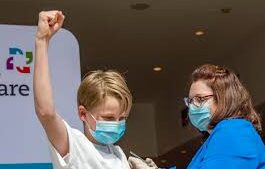In a major break from federal guidance, the American Academy of Pediatrics (AAP) is recommending Covid-19 vaccines for infants and young children a move that clashes with the latest recommendations from the US Centers for Disease Control and Prevention (CDC).
The AAP rolled out its updated vaccine schedule on Tuesday, saying its stance “differs from recent recommendations” made by the CDC’s Advisory Committee on Immunization Practices (ACIP). The group also criticized the CDC panel, noting it was recently overhauled and now includes members with a history of spreading vaccine misinformation.
What the CDC Says vs What the AAP Wants
Currently, the CDC advises that children aged 6 months to 17 years should get the Covid-19 vaccine only after “shared clinical decision-making” between doctors and parents.
The AAP, however, is pushing for a more straightforward approach:
Children 6 to 23 months: All should get a Covid-19 shot, unless they have known allergies to the vaccine or its ingredients.
Children 2 to 18 years: Should get at least one dose if they’re at high risk of Covid-19, live in long-term care facilities, have never been vaccinated, or live with people who are high-risk. The group also says the vaccine should be available to all kids in this age group, not just those at risk.
The AAP has been issuing vaccine schedules for nearly 100 years, usually in step with federal health agencies. But this sharp split with the CDC marks a rare public disagreement.
Rising Tensions Over Vaccine Policy
This clash comes amid growing tension between pediatricians and federal health officials. Earlier this year, Health Secretary Robert F. Kennedy Jr. dismissed all 17 ACIP members, replacing them with seven new ones.
In protest, the AAP boycotted the June ACIP meeting, calling the restructured panel “illegitimate.” Dr. Sean O’Leary, who chairs the AAP Committee on Infectious Diseases, said the meeting pushed a “false narrative” that current vaccine policies are flawed.
By August, the rift widened. Around 30 medical and public health organizations, including the AAP, were formally cut off as ACIP liaisons and told they could no longer join critical workgroups. The dismissal email accused them of being “special interest groups” with expected biases.
Why This Matters
ACIP’s recommendations carry legal weight. Under the Affordable Care Act, insurance companies must cover vaccines endorsed by the committee. ACIP also decides which vaccines are included in the federal Vaccines for Children program, which gives free vaccines to families who can’t afford them.
The AAP is urging insurance providers to also cover its new vaccine schedule. “Pediatricians know how important routine childhood immunizations are in keeping children, families and their communities healthy,” said AAP President Dr. Susan J. Kressly.
Alongside Covid-19, the AAP also updated its guidance for flu, RSV, and more than 10 other vaccines.
Federal Pushback
The Department of Health and Human Services (HHS) hit back, accusing the AAP of playing politics. HHS spokesperson Andrew Nixon said the Academy was “undermining national immunization policymaking” and putting “commercial interests ahead of public health.”
But the AAP insists its guidance is based purely on science. “We created our vaccine schedule based on children’s health and the evidence showing how vaccines protect their immune systems,” Dr. Kressly responded.
Outside Experts Weigh In
The Vaccine Integrity Project, an independent group of health experts, also released findings this week that align with the AAP’s stance. Dr. Michael Osterholm, who heads the project, said their review of thousands of studies found “no scientific evidence” to support recent federal changes to vaccine guidance for pregnant women or children at risk.
He accused federal officials of relying on “flawed” and “wrong” analyses. “It’s vital that providers and the public continue to have vaccine information they can rely on,” he said.
What’s Next?
The FDA has hinted it may restrict Covid-19 vaccines this fall to older adults and high-risk groups, which could leave younger children without access. Pfizer’s vaccine for kids under 5 may also lose authorization.
With respiratory virus season around the corner, the battle over who decides vaccine policy the federal government or independent medical groups is heating up.






